
Rainer Werner Fassbinder, sometimes credited as R. W. Fassbinder, was a German filmmaker, dramatist and actor. He is widely regarded as one of the major figures and catalysts of the New German Cinema movement. Versatile and prolific, his over 40 films span a variety of genres, most frequently blending elements of Hollywood melodrama with social criticism and avant-garde techniques. His films, according to him, explored "the exploitability of feelings". His work was deeply rooted in post-war German culture: the aftermath of Nazism, the German economic miracle, and the terror of the Red Army Faction. He worked with a company of actors and technicians who frequently appeared in his projects.

The Enigma of Kaspar Hauser is a 1974 West German drama film written and directed by Werner Herzog and starring Bruno S. and Walter Ladengast. The film closely follows the real story of foundling Kaspar Hauser, using the text of actual letters found with Hauser.
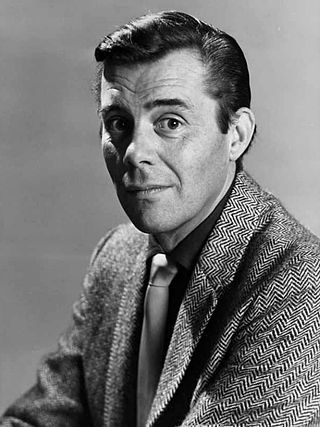
Sir Dirk Bogarde was an English actor, novelist and screenwriter. Initially a matinée idol in films such as Doctor in the House (1954) for the Rank Organisation, he later acted in art house films, evolving from "heartthrob to icon of edginess".

Victim is a 1961 British neo-noir suspense film directed by Basil Dearden and starring Dirk Bogarde and Sylvia Syms. The first British film to explicitly name homosexuality and deal with it sympathetically, it premiered in the UK on 31 August 1961 and in the US the following February.

François Ozon is a French film director and screenwriter.

Doctor in the House is a 1954 British comedy film directed by Ralph Thomas and starring Dirk Bogarde, Kenneth More, Donald Sinden, Donald Houston and James Robertson Justice. It was produced by Betty Box. The screenplay, by Nicholas Phipps, Richard Gordon and Ronald Wilkinson, is based on the 1952 novel Doctor in the House by Gordon, and follows a group of students through medical school.

I Could Go On Singing is a 1963 British-American musical drama film directed by Ronald Neame. It stars Judy Garland in her final film performance alongside Dirk Bogarde, and Jack Klugman. Originally titled The Lonely Stage, the film was renamed so that audiences would know that Garland sings in it; she had not sung in a film since A Star Is Born in 1954.

Despair is the seventh novel by Vladimir Nabokov, originally published in Russian, serially in the politicized literary journal Sovremennye zapiski during 1934. It was then published as a book in 1936, and translated to English by the author in 1937. Most copies of the 1937 English edition were destroyed by German bombs during World War II; only a few copies remain. Nabokov published a second English translation in 1965; this is now the only English translation in print.

The Marriage of Maria Braun is a 1979 West German drama film directed by Rainer Werner Fassbinder. The film stars Hanna Schygulla as Maria, whose marriage to the soldier Hermann remains unfulfilled due to World War II and his postwar imprisonment. Maria adapts to the realities of postwar Germany and becomes a wealthy industrialist's mistress while staying true to her love for Hermann.

Ali: Fear Eats the Soul is a 1974 West German drama film written and directed by Rainer Werner Fassbinder, starring Brigitte Mira and El Hedi ben Salem. The film won the International Federation of Film Critics award for best in-competition movie and the Prize of the Ecumenical Jury at the 1974 Cannes Film Festival. It is considered one of Fassbinder's most powerful works and hailed by many as a masterpiece.

Death in Venice is a 1971 historical drama film directed and produced by Italian filmmaker Luchino Visconti, and adapted by Visconti and Nicola Badalucco from the 1912 novella of the same name by German author Thomas Mann. It stars Dirk Bogarde as Gustav von Aschenbach and Björn Andrésen as Tadzio, with supporting roles played by Mark Burns, Marisa Berenson, and Silvana Mangano, and was filmed in Technicolor by Pasqualino De Santis. The soundtrack consists of selections from Gustav Mahler's third and fifth symphonies, but characters in the film also perform pieces by Franz Lehár, Ludwig van Beethoven, and Modest Mussorgsky. Preceded by The Damned (1969) and followed by Ludwig (1973), the film is the second part of Visconti's thematic "German Trilogy".
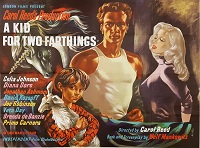
A Kid For Two Farthings is a 1955 British comedy-drama film directed by Carol Reed. The screenplay was adapted by Wolf Mankowitz from his 1953 novel of the same name. The title is a reference to the traditional Passover song, "Chad Gadya", which begins "One little goat which my father bought for two zuzim". At the end of the film, Mr. Kandinsky softly sings fragments of an English translation of the song.

Modesty Blaise is a 1966 British spy-fi comedy film directed by Joseph Losey, produced by Joseph Janni, and loosely based on the popular comic strip Modesty Blaise by Peter O'Donnell, who co-wrote the original story upon which Evan Jones and Harold Pinter based their screenplay. It stars Monica Vitti as "Modesty", opposite Terence Stamp as Willie Garvin and Dirk Bogarde as her nemesis Gabriel. The cast also includes Harry Andrews, Michael Craig, Alexander Knox, Rossella Falk, Clive Revill, and Tina Aumont. The film's music was composed by Johnny Dankworth and the theme song, Modesty, sung by pop duo David and Jonathan. It was Vitti's first English-speaking role.
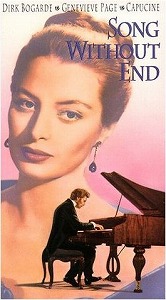
Song Without End, subtitled The Story of Franz Liszt, is a 1960 biographical film romance about Franz Liszt made by Columbia Pictures. It was directed by Charles Vidor, who died during the shooting of the film and was replaced by George Cukor. The film stars Dirk Bogarde, Capucine, and Geneviève Page.

King and Country is a 1964 British war film directed by Joseph Losey, shot in black and white, and starring Dirk Bogarde and Tom Courtenay. The film was adapted for the screen by British screenwriter Evan Jones based on the play Hamp by John Wilson and a 1955 novel by James Lansdale Hodson.
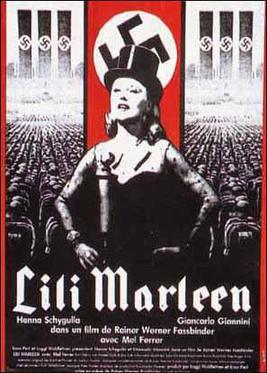
Lili Marleen is a 1981 West German drama film directed by Rainer Werner Fassbinder that stars Hanna Schygulla, Giancarlo Giannini, and Mel Ferrer. Set in the time of the Third Reich, the film recounts the love affair between a German singer who becomes the darling of the nation, based on Lale Andersen, and a Swiss conductor, based on Rolf Liebermann, who is active in saving his fellow Jews. Though the screenplay uses the autobiographical novel Der Himmel hat viele Farben by Lale Andersen, her last husband, Arthur Beul, said the film bears little relation to her real life.

Penny Princess is a 1952 British Technicolor comedy film written and directed by Val Guest and starring Yolande Donlan, Dirk Bogarde and A. E. Matthews. It was made by Guest for his own production company, Conquest Productions. The film stars his future wife Donlan, who was Guest's production company partner, and features Reginald Beckwith, the other partner in Conquest Productions. It was released by General Film Distributors. It was distributed in America the following year by Universal Pictures.

The Doctor's Dilemma is a 1958 British comedy-drama film directed by Anthony Asquith and starring Leslie Caron, Dirk Bogarde, Alastair Sim, and Robert Morley. It is based on the 1906 play The Doctor's Dilemma by George Bernard Shaw. A satire on the pretensions of the medical profession and their concentration on treating patients who can pay well, it contrasts their world of imperfect science, always bumping up against unknowns, with the boundless spheres of love and beauty.
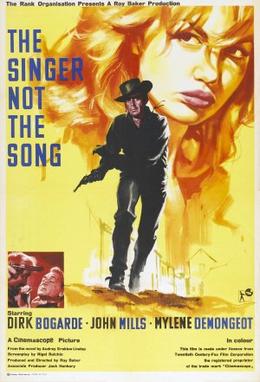
The Singer Not the Song is a 1961 British Western film based on the 1953 novel of the same title by Audrey Erskine Lindop that was directed by Roy Ward Baker and filmed in Spain. It stars Dirk Bogarde, John Mills, and Mylène Demongeot.
Reginald Beck was a British film editor with forty-nine credits from 1932 to 1985. He is noted primarily for films done with Laurence Olivier in the 1940s and with Joseph Losey in the 1960s and 1970s.



















